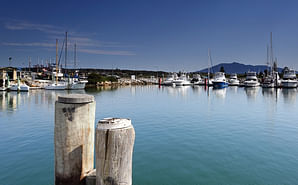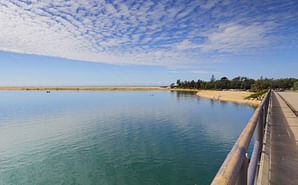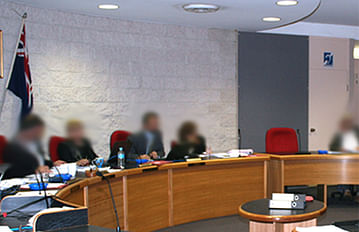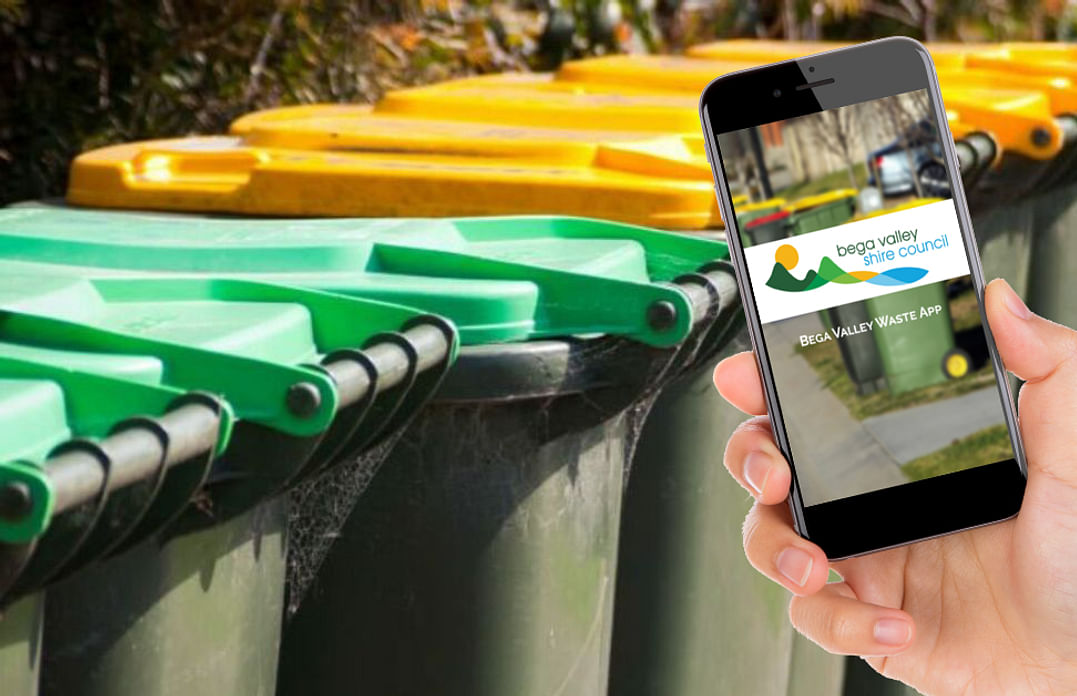- Home
-
Services

Services
Information about Council's regular services and programs.
Airport
Community Services
Environment
- Biodiversity
- Biosecurity and weed management
- Climate Change
- Coast and estuaries
- Environmental programs and partnerships
- Floodplain management
- Pollution incident management
Footpaths and Cycleways
Rates and Charges
Report it
- Abandoned Vehicles and Trailers
- Fish waste recycling bin
- Illegal dumping
- Lost, damaged or stolen bin
- Make a suggestion
- Overflowing Public Litter Bins
- Overgrown land or properties
- Public Liability incident report
- Report an issue
- Streetlight faults
Roads and Parking
Vegetation Management
-
Community

Community
Information about Council's community initiatives and support.
Animals and Pets
- Barking dogs
- Breeders Responsibilities - Dogs & Cats
- Dog walking areas
- Keeping animals
- Ranger Services
- Report a missing pet
- Animals for rehoming
Arts and Culture
- South East Centre for Contemporary Art (SECCA)
- Filming and photography in the shire
- Arts and Culture plan
Bushfire Planning and Recovery
- Coolagolite Bushfire Recovery
- Bushfire Risk Management
- Community Recovery and Rebuilding
- Plan and Prepare
- Emergency Planning - People Living with Disability
Citizenship
Community Support
Events
Grants and Funding
- Council Community Grants
- Funding finder
- Letters of support
- Grant - Expression of Interest
- Community grants program variation request
- Community grants program final report
Have your say
- Community Engagement Strategy
- Documents on exhibition
- Development proposals on exhibition
- Lodge a petition with Council
Health and Safety
-
Business

Business
Information about doing business and investing in the shire.
-
Development

Development
Information about Building and Development in the Bega Valley Shire.
Building and Certification
- About inspections
- Book an inspection
- Building and Certification
- Building Code of Australia
- Building steps check list
- Bushfire provisions and safety
- Construction site management
- Fire safety certification
- Insurance information
- Owner builder information
- Principal Certifying Authority
- Safety when renovating
Bushfire Resilient Housing Toolkit
Certificates
Development Applications (DAs)
- Delays to DA assessment times
- Types of DAs
- The DA process - Your guide
- Planning Portal
- Applications on exhibition
- Approved applications
- Make a submission on a DA
- DA Enquiry
Do I need approval?
- Development advice services
- Electric Vehicles
- Exempt and complying development
- Use of Public Land
- Vegetation and tree management
- Tiny homes
- Land use matrix
Planning
-
Council

Council
Information about how Council operates.
About Council
- Contact us
- Customer service charter
- Payments online
- Policies, procedures and delegations
- Our organisation
- Programs and partnerships
Accessing Council Information
Careers at Council
OUR PLACE
Live, work and play in the Bega Valley Shire
The Bega Valley Shire is an inclusive and welcoming community that integrates quality of life, prosperity, sustainable development, and conservation of the environment.
News and Notices
Browse current Council news and notices, or provide us with feedback on current projects via 'Have your say'.
-

Forums aim to foster long-term employment pathways in the shire
Bega Valley Shire Council is excited to announce two upcoming forums designed to foster long-term employment pathways for cadets and trainees within the local civil construction and trade industries....
Jul 3, 2025
-

Art meets environment in waste truck transformation project
Bega Valley Shire Council is partnering with South East Arts to deliver an exciting public art initiative that combines creativity with sustainability.
Jul 3, 2025
-

New SECCA exhibitions offer local stories and global perspectives
Bega Valley Shire Council is excited to announce the launch of two upcoming exhibitions at SECCA (South East Centre for Contemporary Art) on Friday 11 July that offer distinct yet interconnected perspectives...
Jul 2, 2025
-

New direct debit system – Payble – making it easier for our customers
Bega Valley Shire Council’s new direct debit system – Payble – is making it simpler and easier for ratepayers to pay their rates and water bills.
Jul 2, 2025
-

Help us shape the future of our playgrounds
Bega Valley Shire Council is seeking community input for the development of a Playground Management Plan.
Jul 1, 2025
-

New waste contract secures ongoing high service standards
Bega Valley Shire Council is pleased to announce that Cleanaway will continue as the region’s waste collection contractor, following a competitive tender process completed in late 2024.
Jul 1, 2025
-
UPDATED - Access works for Cobargo cemetery
Due to the recent weather situation, Bega Valley Shire Council advises works will be carried out at the Cobargo cemetery from Tuesday 8 July, to install an internal access road and repair the driveway....
Jul 3, 2025
-
Western end of Merimbula Boardwalk reopened
Repair works on the western end of the Merimbula Boardwalk are now complete and this section of the popular lakeside walk has reopened.
Jun 30, 2025
-
Roadside and public land weed control program
Bega Valley Shire Council advises that the roadside and public land weed control program will be carried out from Monday 30 June 2025 to Friday 19 December 2025, weather permitting.
Jun 26, 2025
-
Access works for Cobargo cemetery next week
Bega Valley Shire Council advises works will be carried out at the Cobargo cemetery from Monday 30 June, to install an internal access road and repair the driveway.
Jun 25, 2025
-
Development Proposal - Bermagui - 2025.108 PAN-512680
An application has been received to develop land at Tathra Bermagui Road, Bermagui for the purpose of 2 lot subdivision.
Jun 20, 2025
-
Update for footpath renewal works on Auckland Street and Carp Street, Bega
Bega Valley Shire Council advises footpath renewal works will be carried out on Auckland Street and Carp Street, Bega from Monday 16 June to Friday 4 July, weather permitting.
Jun 12, 2025
-

Help shape the future of our playgrounds!
Bega Valley Shire Council is planning for the future of play in our community - and we want to hear from you!
Jun 30, 2025
-

Council Meetings Bega Valley Shire Council
Council meeting information, schedules, agendas and minutes.
Feb 17, 2022
-

Make a Suggestion
Help us make it better, suggest something.
Mar 7, 2022
-

Development proposals on exhibition
Have your say on applications open for public comment.
Feb 17, 2022

Need a venue?
The Bega Valley Commemorative Civic Centre has a range of room hire options to suit your needs.
Find out more
Our Libraries have more than just books!
Check out what the library has on offer.
Bega, Bermagui, Eden and Tura Marrang.

Funding notification
Don't miss out on funding, register your expression of interest and be notified when a grant becomes available.
Register your details
When do I put my bin out?
Council's free Waste App helps you stay up to date with bin collection days and learn how to recycle more effectively.
Don't have the Waste app? Find it by searching for Bega Valley Waste in your App store or head to the website.
Need a venue?
The Bega Valley Commemorative Civic Centre has a range of room hire options to suit your needs.
Find out more
Our Libraries have more than just books!
Check out what the library has on offer.
Bega, Bermagui, Eden and Tura Marrang.

Funding notification
Don't miss out on funding, register your expression of interest and be notified when a grant becomes available.
Register your details
When do I put my bin out?
Council's free Waste App helps you stay up to date with bin collection days and learn how to recycle more effectively.
Don't have the Waste app? Find it by searching for Bega Valley Waste in your App store or head to the website.
Need a venue?
The Bega Valley Commemorative Civic Centre has a range of room hire options to suit your needs.
Find out more
Our Libraries have more than just books!
Check out what the library has on offer.
Bega, Bermagui, Eden and Tura Marrang.
Our council websites
Contact Us
- 02 6499 2222
- council@begavalley.nsw.gov.au
-
Zingel Place
PO Box 492
Bega NSW 2550 -
Monday to Friday 9.00AM to 4.30PM
Administration building Zingel Place Bega
Australia -
ABN: 26 987 935 332

